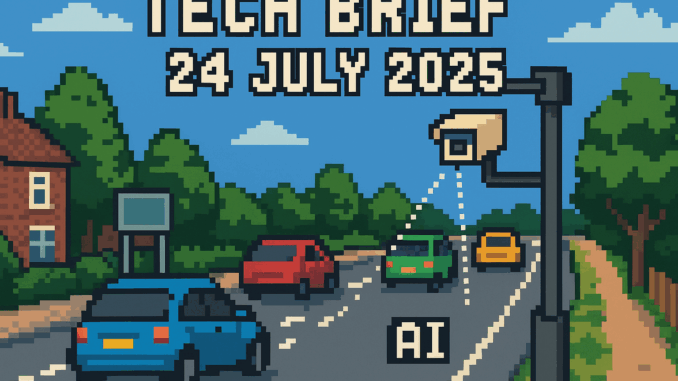
Ever felt that prickle on the back of your neck, wondering if someone’s watching as you tap your phone at a red light, or wrestle with a frozen till at the Post Office? Tech Brief 24 July 2025 brings together the moments, big and small, that shape our digital lives in Britain. Missed yesterday’s Tech Brief? Catch up here before diving in.
UK Police Deploy AI Cameras for Driver Monitoring
Picture this: you’re cruising down the A40, phone buzzing in the passenger seat, when a discreet camera overhead quietly logs your every move. Britain’s new AI-powered road cameras are now scanning for drivers on their mobiles or skipping seatbelts. These cameras use machine learning to detect risky behaviour and alert police for follow-up, shifting enforcement from random spot checks to real-time digital surveillance.
We all remember the first time a speed camera caught us off guard, or the nervous glance at the dashboard when passing one. With the rise of the original Gatso speed cameras in the 1990s, British roads became a proving ground for tech-driven safety. Let’s spare a thought for Maurice Gatsonides, the Dutch rally driver whose love of speed traps led to the original Gatso camera, now reincarnated in digital form across Britain’s roads. This new wave of AI cameras builds on decades of computer vision research and public safety infrastructure. The debate over privacy and safety is far from settled; however, these cameras are changing how we think about personal habits on public roads.
CMA Moves to Check Apple and Google’s Mobile Power
It’s a far cry from the browser wars of the 90s, but the stakes are just as high. The Competition and Markets Authority (CMA) has formally designated Apple and Google as holding “strategic market status” for mobile platforms. This opens the door to stricter scrutiny of their app stores, payment systems, and business practices.
Anyone who’s ever grumbled about high app store fees or a favourite app disappearing overnight will feel the impact. Since the days of dial-up and default browsers, regulators have kept a close eye on tech giants controlling digital access. The CMA’s move aims to make things fairer for both developers and users. The next steps could mean more choice and better pricing; however, app makers face a period of uncertainty. Britain’s decision could ripple out to global app markets, reshaping how we all experience mobile technology.
Subpostmasters Hit by Post Office IT Outage
Why did hundreds of subpostmasters lose money in a single afternoon? A two-hour datacentre outage at Fujitsu left Post Office staff unable to process sales, forcing them to shoulder the costs. For some, that meant hundreds of pounds lost before tea time.
The Post Office’s centralised IT system, already notorious since the Horizon scandal, once again showed its vulnerabilities. Over the decades, reliance on brittle legacy systems has exposed both technical and human risks. Many subpostmasters are now seeking compensation, but support remains patchy. This latest incident is a reminder that even as infrastructure advances, the fallout from failure lands hardest on the people at the front line. Transparency and proper support are still in short supply when digital systems falter.
OpenAI and UK Government Announce Strategic AI Partnership
OpenAI and the UK government have signed a wide-ranging agreement to deploy artificial intelligence in public services, including the NHS, education, and defence. Backed by an investment of approximately £500 million, the partnership aims to boost infrastructure, create high-skilled jobs, and ensure AI development stays under British oversight.
With the introduction of home computers like the Sinclair ZX Spectrum and BBC Micro, Britain earned a reputation for technological independence. This move signals a determination to shape the next era of digital innovation. The collaboration could set new standards for ethical AI; however, questions about public accountability and the speed of change remain. The AI Opportunities Action Plan is designed to keep the UK at the forefront of responsible AI use, but the real impact will be felt in classrooms, clinics, and communities.
From the Wayback Machine
On This Day: 1950 – First Rocket Launch at Cape Canaveral
Seventy-five years ago, the United States launched Bumper 8 from Cape Canaveral, combining a German V-2 rocket with an American WAC Corporal upper stage. The Bumper 8’s launch was as audacious for its time as landing a Tesla on Mars is today, proof that ambition and teamwork can change the course of history. With radio telemetry and stage separation, Bumper 8 paved the way for every Mercury, Gemini, and Apollo mission that followed. The technology and principles tested in 1950 remain central to today’s reusable rockets and international space efforts.
What This Means
Tech Brief 24 July 2025 shows that Britain’s digital story is shaped by public infrastructure, regulation, and resilience. Let’s stay alert to how new systems can improve lives but also create new risks. Each headline invites us to balance progress with the lessons of history and to keep questioning how technology shapes our daily routines.
Stay curious about the tech shaping your world. Let’s keep tinkering, questioning, and remembering what matters most, even if it’s just a beep from a forgotten machine.
Missed yesterday’s Tech Brief? Catch up here.

Leave a Reply